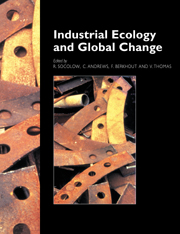Book contents
- Frontmatter
- Contents
- Foreword
- Preface
- Acknowledgments
- Contributors
- OVERVIEW
- PART 1 VULNERABILITY AND ADAPTATION
- PART 2 THE GRAND CYCLES: DISRUPTION AND REPAIR
- PART 3 TOXICS AND THE ENVIRONMENT
- PART 4 INDUSTRIAL ECOLOGY IN FIRMS
- 23 Introduction
- 24 Product Life-Cycle Management to Replace Waste Management
- 25 Industrial Ecology in the Manufacturing of Consumer Products
- 26 Design for Environment: A Management Perspective
- 27 Prioritizing Impacts in Industrial Ecology
- 28 Finding and Implementing Projects that Reduce Waste
- 29 Free-Lunch Economics for Industrial Ecologists
- PART 5 INDUSTRIAL ECOLOGY IN POLICY-MAKING
- END PIECE
- Organizing Committee Members
- Working Groups
- Index
23 - Introduction
Published online by Cambridge University Press: 04 August 2010
- Frontmatter
- Contents
- Foreword
- Preface
- Acknowledgments
- Contributors
- OVERVIEW
- PART 1 VULNERABILITY AND ADAPTATION
- PART 2 THE GRAND CYCLES: DISRUPTION AND REPAIR
- PART 3 TOXICS AND THE ENVIRONMENT
- PART 4 INDUSTRIAL ECOLOGY IN FIRMS
- 23 Introduction
- 24 Product Life-Cycle Management to Replace Waste Management
- 25 Industrial Ecology in the Manufacturing of Consumer Products
- 26 Design for Environment: A Management Perspective
- 27 Prioritizing Impacts in Industrial Ecology
- 28 Finding and Implementing Projects that Reduce Waste
- 29 Free-Lunch Economics for Industrial Ecologists
- PART 5 INDUSTRIAL ECOLOGY IN POLICY-MAKING
- END PIECE
- Organizing Committee Members
- Working Groups
- Index
Summary
Product and process design choices used to be a private concern, of primary interest within rather than outside the firm. Design decisions reflected the firm's priorities, such as low production cost, high quality, and easy manufacturability. In recent years environmental problems have resulted in public policy interventions, changed consumer preferences, and new constraints on industry behavior. Yet in many cases, environmental information is inadequate. Thus engineers rarely understand the overall environmental impacts of their design choices; government policy-makers have inadequate information for making environmental policy; and few consumers know what they buy.
Industry is recognizing the need for new approaches, in order to: (1) include environmental criteria in product and process design, (2) improve cooperation between firms and government regulators in developing more precisely targeted, cost-effective policies, and (3) anticipate future environmental constraints, liabilities, and opportunities.
New approaches will build upon the steadily improving understanding of pollutant flows and human exposures. The objective is developing fair, efficient, and stable strategies that can win public acceptance.
Part 4 contains six chapters that give insights into the state of play in firms today, as they search for new ways to take advantage of the insights of industrial ecology. To set a context for these chapters, we review below some of the evolving methods in support of environmentally sensitive decision-making.
Materials Balance Accounting
Materials used by industrial societies undergo numerous transformations in the time between their extraction from the earth as raw materials and their deposition back to the environment as wastes.
- Type
- Chapter
- Information
- Industrial Ecology and Global Change , pp. 331 - 334Publisher: Cambridge University PressPrint publication year: 1994



